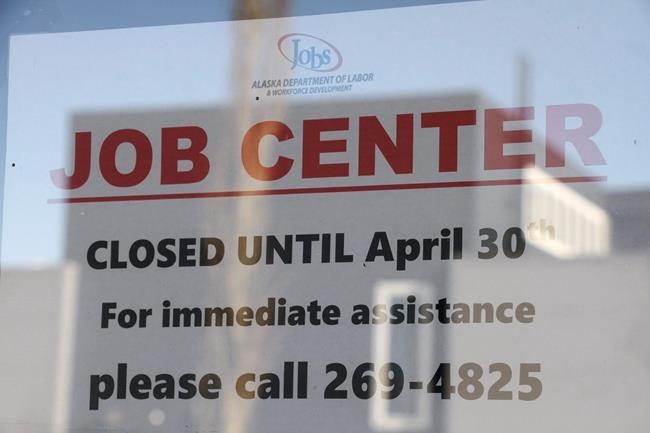
A sign saying that the Jobs Center at the Alaska Department of Labor and Workforce Development office in midtown Anchorage, Alaska, is closed through the end of April is shown Monday, March 30, 2020. (AP Photo/Mark Thiessen)
Republished March 30, 2020 - 6:08 PM
Original Publication Date March 30, 2020 - 2:51 PM
JUNEAU, Alaska - Alaskans who found themselves suddenly out of work or working reduced hours because of shutdowns over the coronavirus were buoyed by news last week that lawmakers had proposed paying a $1,000 stimulus check to residents.
Checks would have gone to residents who received Alaska Permanent Fund dividends last year — most Alaskans — regardless of need. The proposed payment was included in the Senate version of the state budget and would have been on top of a roughly $1,000 proposed dividend later this year.
But the stimulus check was removed from the compromise version of the budget advanced by House and Senate negotiators, leaving some lawmakers upset. Rep. Cathy Tilton of Wasilla, in a floor speech before the package passed the House early Sunday, said people got their hopes up after the Senate inclusion of the payment.
“I believe in expectation management, Mr. Speaker, and shame on us because we got their expectations up,” said Tilton, a minority Republican.
Other lawmakers said they were trying to be careful stewards with the state's resources and target relief to Alaskans through legislation that includes provisions such as moratoria on evictions and foreclosures. They also noted Congress recently approved an aid package.
The stimulus checks, which would have been paid before July 1, would have required a draw from permanent fund earnings beyond a withdrawal limit many lawmakers have been loathe to violate.
Rep. Chuck Kopp, an Anchorage Republican, said an organizing principle for the bipartisan House majority, of which he's a part, was staying within the draw limit. He said it “should not be a surprise to anyone that we actually meant it.”
Gov. Mike Dunleavy said he was “puzzled” by the Legislature's decision. The Republican had proposed an immediate check of about $1,300, plus a dividend of about $3,100 that would have been paid in two installments, in June and October. That amount, $3,100, is roughly what the dividend would be this year if a longstanding calculation were followed. That formula was last followed in 2015 amid a years-long deficit.
House Speaker Bryce Edgmon, in a Facebook post Monday, said it's time for everyone to have "an honest conversation about Alaska's fiscal future.”
“Clearly, the state faces a public health crisis the likes of which we’ve never encountered. But we're also on the cusp of financial calamity and it could be here for a while,” the independent from Dillingham said. Recent North Slope oil prices have been below $30 a barrel.
The state relies on oil revenue and permanent fund earnings to help pay for government expenses. Market volatility has also affected the fund. Edgmon said the state doesn't have the money to pay both a large dividend and services people expect to receive.
Dividends the last two years have been about $1,600. They were $1,022 in 2016 and $1,100 in 2017. This year the dividend, traditionally paid in the fall with oil-wealth fund earnings, would be paid, in part, using the constitutional budget reserve.
Lisa Seifert, who is a photographer in Anchorage and has a vacation rental property, said she recently lost $2,000 of scheduled income and has had cancellations into June. She said the $1,000 stimulus would have helped with her bills and “peace of mind.” She said she's worried.
The budget passed over the weekend would further draw down the constitutional budget reserve, which requires three-fourths support from each the House and Senate to tap. Some in the House minority had seen their vote as leverage. But language in the package made funding for certain items, including part of the dividend and provisions related to the coronavirus, contingent upon reaching the three-quarter threshold.
The budget also would move $1 billion from permanent fund earnings to the fund's constitutionally protected principal. Sen. Bert Stedman, a Sitka Republican, saw this as a way to help safeguard those funds but others worried it could remove some funding flexibility for emergencies.
Legislators have gone through billions of dollars in savings unable to agree on how to resolve the deficit. Lawmakers took a hiatus after passing the budget early Sunday, allowing them to return to their communities amid coronavirus concerns.
Dunleavy, who has veto powers, still must review the budget.
Alaska has seen its unemployment claims spike amid closures due to virus concerns, and major state industries, including tourism and fishing, are bracing for impacts.
Mouhcine Guettabi is an associate professor of economics at the Institute of Social and Economic Research at the University of Alaska Anchorage.
He said the long-term consequences of overdrawing the permanent fund earnings reserve are important to consider, and that one can't overdraw on a regular basis. “I think the question right now is, given the depths of the economic decline, should unprecedented measures be taken or should the earnings reserve be used because it is indeed a rainy day fund and it is going to be raining really hard,” he said.
Guettabi said he appreciates the concern about the fund's long-term viability and thinks the fund has been well managed.
“I think that when you have reserves and you know that economic calamity potentially is coming, you're going to have to do things that you didn't think that you should do,” he said.
News from © The Associated Press, 2020